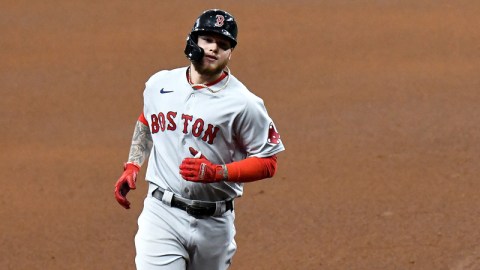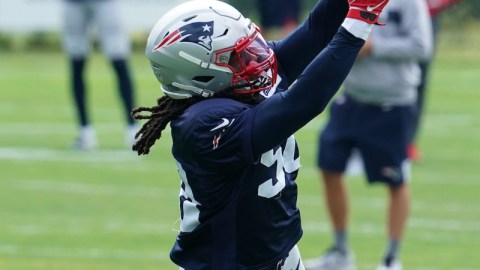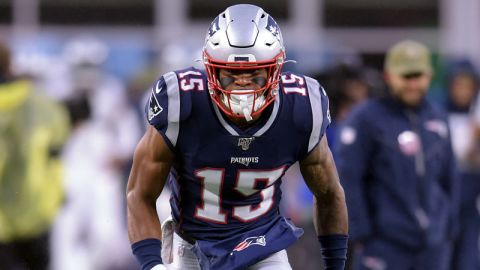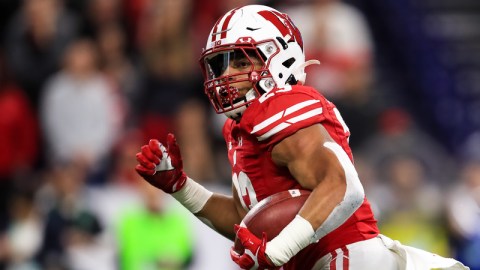The Boston Celtics won 53 games and finished with the Eastern Conference’s No. 1 seed before reaching the conference finals. Not a bad little season, right?
Boston’s season, by all accounts, was a success, as Celtics president of basketball operations Danny Ainge is in the middle of trying to make this team a legitimate championship contender. But with the way the Cleveland Cavaliers ran through the C’s in the Eastern Conference finals, earning a third consecutive NBA Finals date with the Golden State Warriors, it’s clear Boston still has some work to do before it can move its stuff into the NBA’s penthouse.
If Ainge plays his cards right this summer, however, the Celtics conceivably can take a giant leap forward. Whether that’s enough of a leap to legitimately contend for a title remains to be seen, but there are options both internally and externally.
We know building a super team isn’t as easy as it might seem, but here’s how we’d attack the offseason.
FREE AGENTS
Amir Johnson
Johnson was a nice signing a couple of summers ago and landing a (relatively) big-name free agent was a sign Boston was going in the right direction. But he’s got nearly 800 career games under his belt, and there was a fairly evident drop-off from his first season in Boston.
The verdict: Let him go.
Jonas Jerebko
He gave the Celtics some decent minutes in the Eastern Conference finals, but that was mostly a result of circumstance more than anything else (injuries, the Celtics being down by about a hundred points and needing to find something, anything different to do, etc.). He’s an OK player, but the Celtics have “OK” players in spades and can afford to let him walk.
The verdict: Let him go.
Kelly Olynyk (restricted)
Olynyk’s Game 7 performance in the second round against Washington might have just set him, his kids, his kids’ kids and his kids’ kids’ kids for life. If the NBA taught us anything last summer, it’s that there’s no shortage of cash to throw around. Olynyk might not get Evan Turner money, but he’s a useful player. He has size and can stretch the floor with an ability to shoot from deep. But the Celtics’ biggest problems all season were rebounding and defense. Despite his 7-foot frame, Olynyk doesn’t add much in either category. If you can keep him for a reasonable amount of money, he still makes sense, but we’re betting another team gives him a contract the Celtics ultimately shouldn’t match.
The verdict: Let him go (if/when someone else gets stupid).
James Young, Gerald Green
Maybe Boston revisits Green toward the end of the offseason if he doesn’t catch on somewhere and you get him on the cheap to fill out the roster. Regardless, you can do better.
The verdict: Let them go.
TRADES?
Isaiah Thomas
The Celtics (barely) won one game in the Eastern Conference finals, and it just so happened to come after Thomas was ruled out for the rest of the postseason with a hip injury. The conversation turned to “are the Celtics better without Isaiah Thomas?”
Boston lost the next two games by a combined 46 points. The 5-foot-9 (lol) Thomas is a defensive liability, but his absence didn’t really make the Celtics better defensively, as Cleveland averaged almost 120 points per game in the time he missed. Thomas still is the emotional leader of this team, and his contract ($6.3 million next season) is team-friendly. Unless Ainge is going to do something way out there, it doesn’t make much sense to part with a second-team All-NBAer.
The verdict: Keep him and build around him.
Avery Bradley
This is one of the toughest decisions on the Celtics roster. Bradley always was a great defender, but the strides he’s made on the offensive end since his rookie season are undeniable. Is he untouchable?
If the Celtics take Markelle Fultz with the No. 1 pick in the NBA draft, an already guard-heavy team gets guard-heavier. That could make Bradley expendable. Parting with a player like him would suck, but if it’s to acquire one of the 10 best players in the league, the Celtics have to consider.
The verdict: Keep him, if possible, but get ready to part with him — you have to give something to get something.
Jae Crowder
Given the aforementioned spike in salaries over the last couple of seasons, a healthy Crowder and his $7 million-ish per season through 2020 could seem attractive. He looked a step slower at times this season, but he’s still a good on-ball defender with size. His shot selection can be frustrating, but he can sometimes get hot from behind the arc. At a certain point, though, these are the types of players you have to pool together in order to get a better player. Really, no one should be untouchable, and Crowder is the type of player Boston shouldn’t hesitate to move to get a much better player if that sort of trade presents itself.
The verdict: Don’t be afraid to move him.
Marcus Smart
Again, another cost-controlled guard, as Smart’s set to make around $4.5 million next season. The former No. 6 pick is a game-changing talent when he’s playing his best. But just how often does that happen?
The problem with Smart — and a lot of the Boston roster, really — is that he fits best as a role player. When you ask him to do too much, it becomes, well, too much. But at the same time, even super teams need role players. Bradley probably offers more trade value than Smart, so this might be an instance where it makes more sense to keep the “lesser” player in order to maximize the potential trade offer.
The verdict: Keep him — someone needs to come off the bench.
Terry Rozier, Jaylen Brown
We’re going to lump both of these players together for a reason. Both showed glimpses of very bright futures, especially in the Cleveland series. Brown has star potential, especially once his offensive game further develops. Rozier, meanwhile, plays hard every night and was one of the only C’s who could generate much energy after Thomas went down. He could be the next Bradley.
The verdict: Keep them both.
Al Horford
Not going anywhere.
The verdict: Keep him.
Tyler Zeller
Eh.
The verdict: Let him go, unless you can work him into a trade.
SUMMARY
It should be a busy summer for Ainge and Co. The opinion here is the Celtics move on from pretty much all of their free agents and set their sights (and money) on a player like Gordon Hayward, who seems to make all the sense in the world.
Also, you take Fultz with the first pick in the draft, and if you can make the money work, you package Crowder, Bradley and some collection of draft picks to try to get creative on the trade market — this admittedly is vague, but it illustrates the surplus of options the Celtics have this offseason.
Thumbnail photo via Winslow Townson/USA TODAY Sports Images




